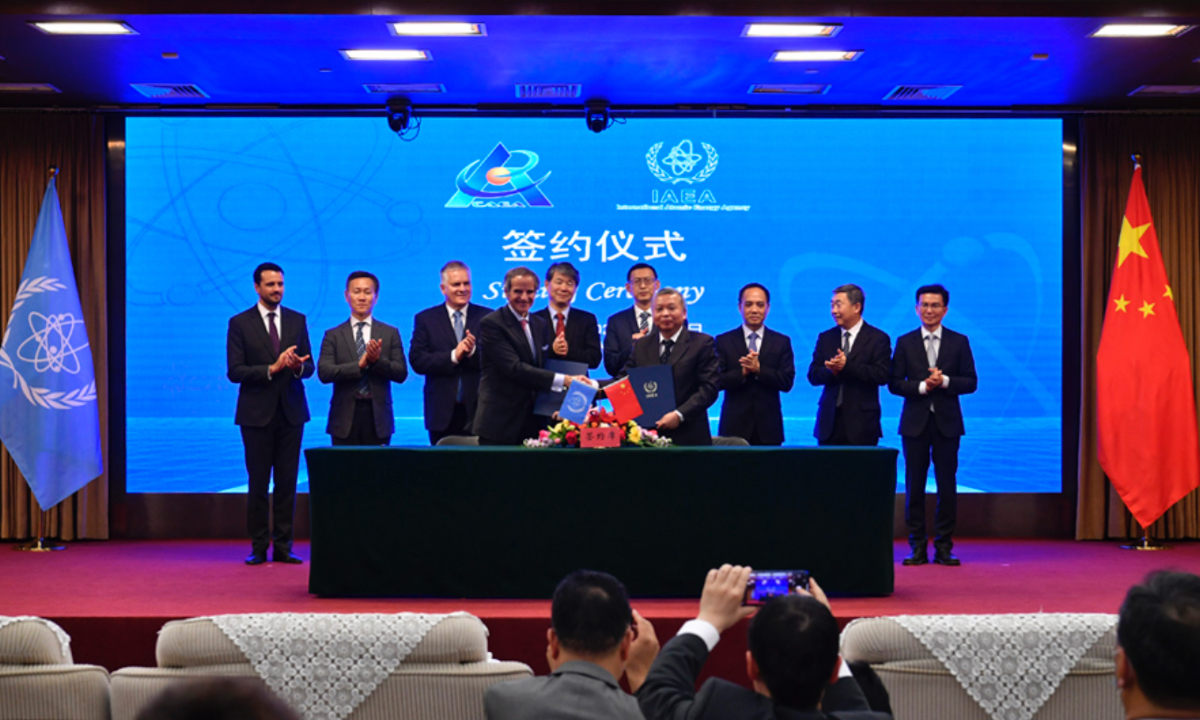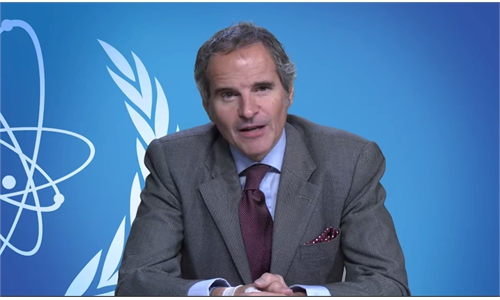IAEA designates China’s Nuclear and Radiation Safety Center as its first Collaborating Centre globally

IAEA Director General Rafael Mariano Grossi (left in the front) and other IAEA officials sign agreements with the China Atomic Energy Authority (CAEA) officials on May 22, 2023. Photo: China Atomic Energy Authority
Director general of the International Atomic Energy Agency (IAEA), Rafael Mariano Grossi, is paying his first official visit to China from Monday to Friday and IAEA designated China’s Nuclear and Radiation Safety Center (NSC) as the first IAEA Collaborating Centre globally on Monday.
At the invitation of the China Atomic Energy Authority (CAEA), Grossi is paying his first official visit to China since he took office as IAEA Director General in 2019.
Zhang Kejian, chairman of the CAEA, praised Grossi's leadership in the achievements of the IAEA in promoting nuclear energy in response to climate change, diversifying the application of nuclear technology, and assisting member states in achieving the United Nations Sustainable Development Goals.
Zhang commended Grossi's efforts in coordinating and promoting nuclear security and safeguards cooperation, as well as mediating sensitive nuclear issues.
He also detailed China’s safe and orderly development of nuclear energy, highlighting the significant progress and achievements that China has made in promoting the science and technology innovation, industrial development and civilian applications of nuclear energy.
Zhang emphasized that the dumping of the nuclear-contaminated water at the Fukushima Daiichi Nuclear Power Plant into the ocean is a significant issue affecting global marine environment and public health. Since the IAEA is the most important intergovernmental organization in the nuclear field, it is hoped that the IAEA Technical Working Groups will maintain an objective, fair, and scientific attitude in conducting a rigorous review of Japan's dumping plan, to ensure that the final assessment report fully reflects the opinions of experts from all parties, withstands historical scrutiny and does not endorse the plan.
Grossi highly appreciates China-proposed Global Development Initiative and Global Security Initiative. He actively acknowledges China’s achievements in the development of nuclear energy and the application of nuclear technology, fully recognizes the long-term cooperation results between China and the IAEA and looks forward to further deepening cooperation with China in various fields.
He also reiterated the IAEA’s commitment to conducting comprehensive, rigorous, and effective assessments and monitoring of the discharge of the nuclear-contaminated water at the Fukushima Daiichi Nuclear Power Plant. This includes thorough evaluations and independent monitoring throughout the entire process, including before, during, and after the discharge.
The IAEA signed a cooperation agreement with China’s Nuclear and Radiation Safety Center (NSC) of China’s Ministry of Ecology and Environment (MEE) on Monday and designated the NSC as IAEA's first-ever Collaborating Centre for nuclear and radiation safety in the world, highlighting China’s commitment to nuclear safety and the potential to strengthen bilateral relations.
Grossi and Tian Weiyong, chief engineer of nuclear safety of MEE and deputy director of China’s National Nuclear Safety Administration (NNSA), addressed the launch ceremony of the center.
The collaborating center is the relevant institutions from the member states designated by IAEA that serve as cooperative partners in jointly conducting activities selected by the IAEA in specific areas.
The IAEA has recognized the effectiveness of China's regulatory work in the comprehensive assessment of nuclear and radiation safety and commended China’s MEE (NNSA) as an effective and reliable nuclear safety regulatory body.
According to the cooperating agreement, as an IAEA Collaborating Centre, the NSC will utilize its own resources and advantages to collaborate with IAEA member states in terms of nuclear safety, radiation safety, transport safety, waste safety and security and make active contribution to promoting the capacity construction of IAEA member states.
The establishment of the Collaborating Centre will help share China's practices and achievements in nuclear and radiation safety regulation, draw on the wisdom and experience of international counterparts, and create a global exchange and cooperation platform covering nuclear and radiation safety.
It will also support China’s active participation in international nuclear safety governance, and fulfill China’s commitment to help countries in need enhance their safety regulatory capabilities and make contributions to improve the global nuclear power safety level, which will promote the building of a community with a shared future for mankind and realize a win-win cooperation.
Witnessed by Zhang and Grossi on Monday, China National Nuclear Corporation (CNNC) and IAEA signed several agreements which reflect the diverse scope of work between the IAEA and China.
The agreements will strengthen cooperation on small modular reactors, nuclear fusion, and nuclear data, fuel cycle and waste management, as well as communication activities.
An agreement was also signed in support of Rays of Hope, the IAEA initiative to promote cancer care for all by improving availability of radiotherapy services, medical imaging and nuclear medicine that are critical for detecting and curing this disease.
Tongfang Co., Ltd under the CNNC donated two nuclear security detectors to IAEA.
Grossi visited the China Institute of Atomic Energy (CIAE) under CNNC as the first stop of his visit to China. In his speech, Grossi said that he was honored to have the opportunity to exchange ideas with the professionals who are driving the advancement of nuclear science and technology, noting that they are making influence on the solutions to the real problems in the world.
Global Times

